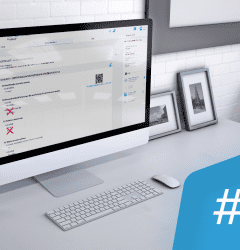17 Oct

Why do chemical companies believe they can transform into software businesses?
It’s a common misunderstanding across the chemical industry. Time and again, companies overestimate their internal capacities and underestimate the complexities of building software. But let’s be honest: How many chemical companies have truly succeeded in becoming software or data businesses? What are the odds your company will succeed?
The idea that you can simply “build it yourself” might seem appealing. After all, it gives the illusion of control, customization, and cost-saving. But, is it really that simple?
Let’s break down why this approach may not be as straightforward as it seems.
1. It’s Not About Getting the Data in One Place
Sure, collecting data in one place sounds like a good start. But it’s not just about storing data – it’s about what data you’re collecting and how you do it. For chemical companies, this means understanding the difference between formulations and chemical compositions and developing a database that can accurately capture and manage both, along with numerous parameters.
For instance, physical and chemical data can have up to 10 data points each. And that’s just for one parameter! Then there’s multilingual content for technical data sheets (TDS), not to mention the regulatory requirements. So, while collecting data is the first step, it’s hardly the whole picture.
2. Data Administration Isn’t Simple
Let’s talk about user interfaces (UI). With so many fields and rules, building an intuitive, flexible UI is a significant challenge. The more complex the data, the more sophisticated the interface needs to be. Think of all the validation rules, screens, and workflows you need to design. For example, we spent years perfecting this in Chemius, and building something from scratch means replicating those efforts.
3. Data Governance is Critical
Once you have data, how do you ensure it’s stored securely and used properly? How do you maintain confidentiality, especially when dealing with sensitive chemical formulations? Data governance is not an afterthought – it’s a core feature that requires planning, structure, and expertise.
4. Compliance Requires Domain Expertise
Chemius isn’t just a data storage tool – it supports numerous regulatory checks that ensure compliance with industry standards. The knowledge required to handle these regulations is extensive. Can your IT department manage the compliance intricacies of chemical regulations? This isn’t just coding; it’s deep domain knowledge built into the platform.
5. User Management and Sharing
User roles and permissions are closely tied to data governance. How do you manage who can see what, and who can edit what? Defining these rules is fundamental, especially when you’re dealing with multiple users across different departments or even different companies. Can you implement a system robust enough to handle that complexity?
6. User Interface Matters for Adoption
A complex tool that’s difficult to use will never gain traction. User interface (UI) design requires a deep understanding of processes to ensure that users can easily adopt the system. A well-designed UI increases usability and significantly improves the chances of successful implementation. We’ve invested years fine-tuning this in Chemius, and I hold very high standards when it comes to UI. We don’t release new features unless they’re intuitive and easy to use.
7. APIs and Connectivity
One of the strengths of a platform like Chemius is its ability to connect with other tools via APIs. Integrations allow for automation and seamless data exchange. Building this from scratch? That’s another layer of complexity that requires experience and foresight.
8. Continuity is Key
Starting an internal project sounds exciting – until it hits delays, challenges, or worse, when key team members leave. It’s not uncommon for such projects to end up half-completed, leading to wasted time and resources. In contrast, using an established platform like Chemius ensures continuity, ongoing support, and feature updates.
Time: The Biggest Factor
Let’s talk about time. Developing a platform like Chemius could easily take more than five years, if everything runs smoothly – but this is rarely the case. During that time, Chemius itself will continue evolving, staying ahead of the game while you’re still working on the basics. The longer it takes, the more resources are wasted, and the more you fall behind competitors who chose to adopt an existing solution.
Focus on What Matters
When weighing the decision to build, buy, or hire, consider this: Do you want to spend your resources developing a software platform for the next five years, or would you rather focus on what truly matters – growing your business, delivering value to your customers, and gaining a competitive advantage?
With Chemius, you get immediate value. It’s a ready-to-implement solution designed by experts in both chemical regulation and software development. Custom requirements? They’re incremental and easily implemented, unlike the long, complex journey of building from scratch.
So, before starting a potentially costly and uncertain project, consider whether it’s worth the risk. Sometimes, using a proven solution is the smartest decision you can make.
Ready to turn compliance into your competitive advantage?
Book a meeting with our experts to discover how Chemius can streamline your processes, enhance customer value, and give you a real edge over the competition.



Bojan Buinac